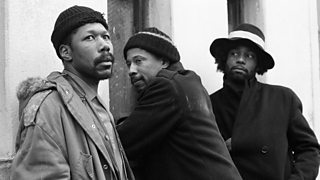Play for Today – A national theatre in our living room
For Archive on 4, actress Alison Steadman celebrates 50 years since Play for Today was launched on ´óÏó´«Ã½ television.
The series ran from 1970 until 1984 and offered the audience hundreds of plays, many of which tackled the thorny issues of the day – industrial relations, the rise of the far right, poverty and consumerism.
It also included classics such as Abigail's Party and Nuts in May – which starred Alison Steadman and shone a perceptive light on suburban pretentions and preoccupations.
Here, British Film Institute curator Simon McCallum reflects on this landmark drama strand.
All photos © ´óÏó´«Ã½

Talk of a "Golden Age" of British television tends to provoke heated debate from some, groans from others. As important as looking back can be, the emphasis in broadcasting tends to fall on the here and now, the next big thing.

But for both the ´óÏó´«Ã½ and BFI the 50th anniversary of the astonishingly rich single drama strand Play for Today (1970-84) could not pass unmarked, even (or especially) in this most challenging of years.
The strand’s predecessor The Wednesday Play (1964-70) had transformed British television with its uncompromising dramas tackling the concerns of a rapidly changing Britain - Ken Loach’s celebrated Cathy Come Home (1966) among them. Yet Play for Today would break the mould once again, blossoming into a genre-transcending look at life and the human condition.
Often remembered for politically-charged social realism, that’s just part of the story; the strand ventured into comedy, sci-fi and folk horror, while extensive location filming one week might be followed by a claustrophobic studio-based chamber piece. This was also a testing ground for many of Britain’s most dazzling new and emerging talents in acting, writing, directing and producing, amplifying regional voices from across the UK.
At the BFI National Archive, we look after not only our cinematic heritage but also the national television collection, working closely with the ´óÏó´«Ã½ Archive and archives around the UK to preserve our small-screen history. This anniversary was firmly on our radar for some time, and colleagues from across the BFI have been involved in celebrating it in collaboration with the ´óÏó´«Ã½.
We’re thrilled to be able to present twelve carefully selected plays on the big screen in BFI Southbank’s Play for Today at 50 season. We’ve screened countless editions of Play for Today over the years, and assist venues around the UK to do so too.
Half of the surviving plays are now available for free public viewing in the BFI Mediatheque – an essential resource for fans and scholars of TV drama alike. 30 of the original 300 plays do not survive, though scripts and other documents are preserved in BFI Special Collections and in the ´óÏó´«Ã½ Archive, and will be referenced in a new ´óÏó´«Ã½ History online exhibition.

Narrowing down a list of some 270 plays has been a team effort, calling on a range of curatorial voices within the BFI and beyond. One goal was to showcase plays which pushed the envelope in representing the marginalised.

We will screen A Hole in Babylon (1976), writer-director Horace Ové’s depiction of the political rage motivating the young Black men behind the 1975 Spaghetti House Siege.
The extraordinary Even Solomon (1979) was the first British television drama to feature a transgender lead character. Strong female characters abound, and we highlight the little-seen work of writers such as Carol Bunyan (Ladies, 1980).
Play for Today is not simply a time capsule of 1970s Britain. Contemporary resonances echo through so many of these works they demand our renewed attention; David Edgar’s chilling study of far-right politics Destiny (1978) just one example.
The strand’s remarkable legacy reminds us of the power of television drama to foster understanding and connection in a world that often makes very little sense.

Exploring Play for Today
-
![]()
Archive on 4: Play for Today
Alison Steadman celebrates 50 years of ´óÏó´«Ã½ television's seminal drama series.
-
![]()
Marking the 50th anniversary of Play for Today at BFI Southbank, on BFI Blu-ray, and online. [BFI site]
-
![]()
History of the ´óÏó´«Ã½
The ´óÏó´«Ã½ History quick guide to Play for Today.
-
![]()
Katie Crosson of Royal Holloway College examines the phenomenon of Play for Today in collaboration with the BFI.




